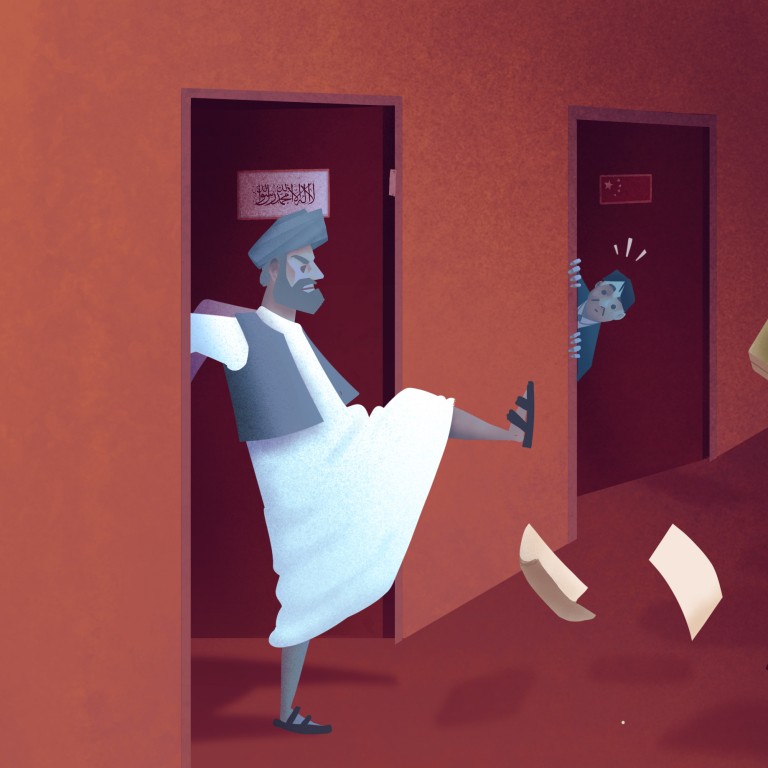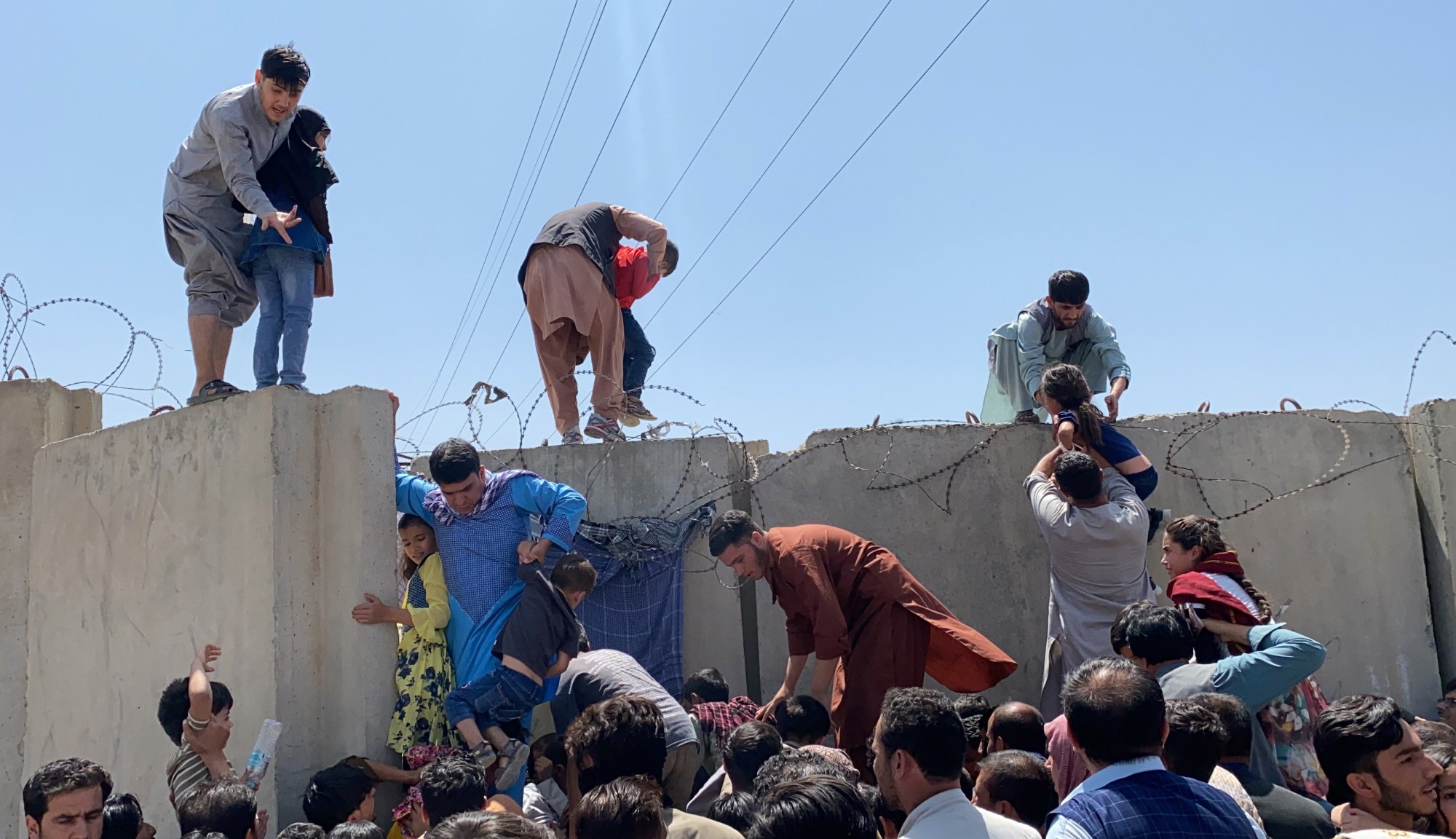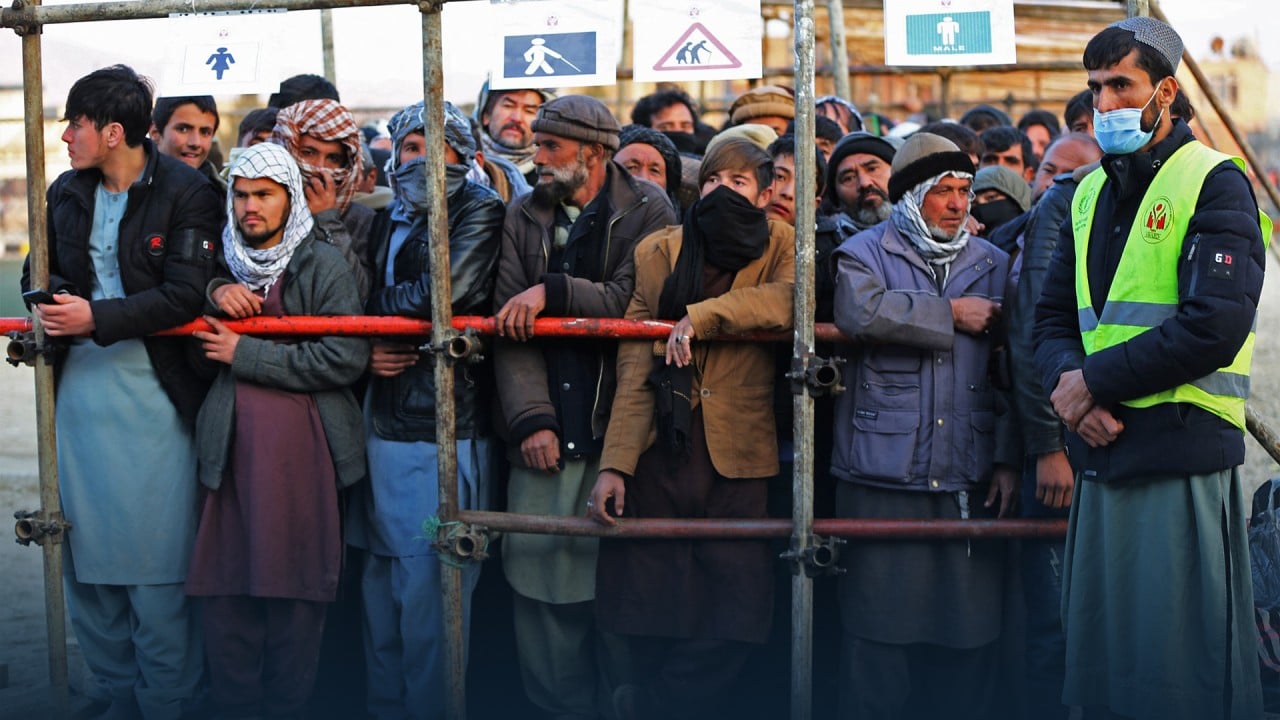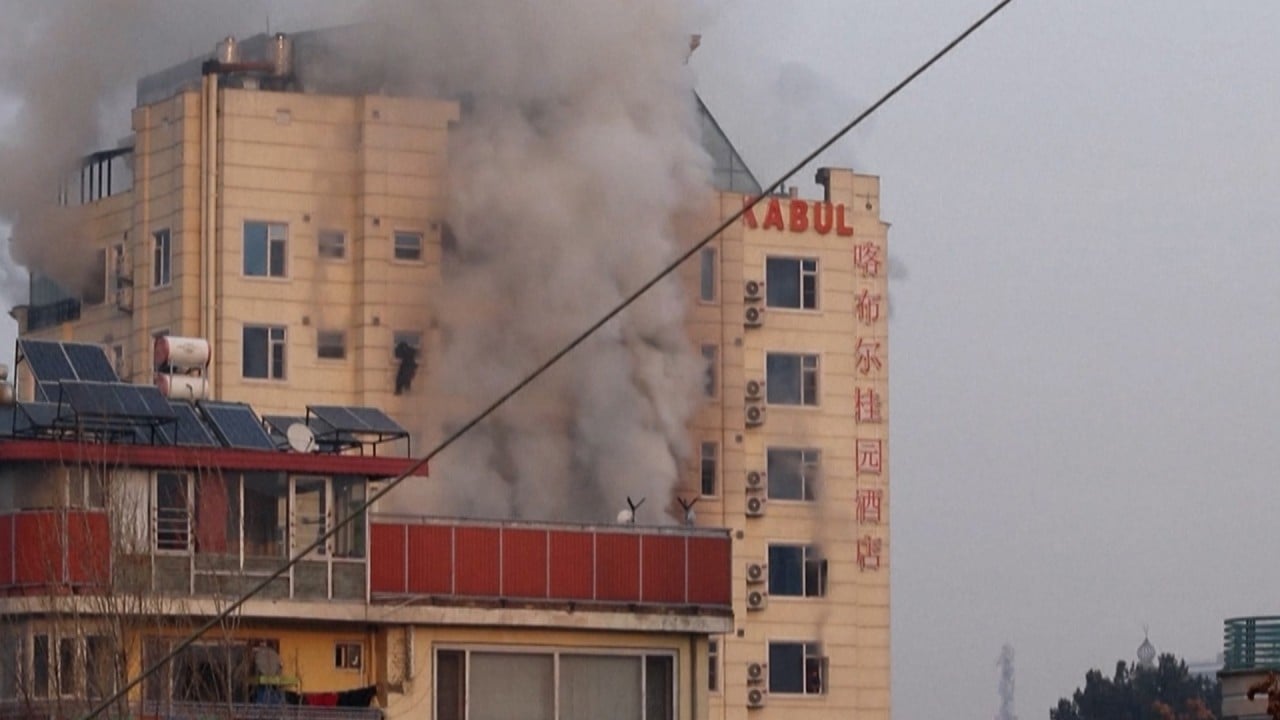
Why China is still on the sidelines in Afghanistan, 2 years after messy US troop pull-out
- China has made no secret of its joy over the US Afghan debacle, mocking the rival power for failing to learn ‘profound lessons’ from the ‘Kabul moment’
- But it has been reluctant to fill the void, with pundits citing ‘no illusions about great influence over the Taliban’ and lingering security risks
The withdrawal of US troops from Afghanistan in the summer of 2021 continues to be seen as a “black mark” on Joe Biden’s presidency – a chaotic and deadly exit that left the war-torn country in a security vacuum as the Taliban swiftly advanced on Kabul.
Afghanistan’s severe food insecurity, bleak security and economic situation, and the Taliban’s repressive policies against women and girls indicate that the strategic fallout from the messy end to the US military presence could be felt for many years to come, pundits said.
Despite being widely criticised over the US and Nato pull-out, Biden had remained defiant, defending the end of the “longest war in American history” as an “extraordinary success”, and claiming the Afghan exit would help the US focus its energies on the strategic rivalry with China.
“There’s nothing China or Russia would rather have, would want more in this competition than the United States to be bogged down another decade in Afghanistan,” Biden said on August 31, 2021, in a statement marking the end of the evacuation operation.
China has made no secret of its joy at America’s Afghan debacle and what it calls the failure of US hegemony. It repeated those sentiments on Tuesday – the two-year anniversary of the Taliban takeover of Kabul.
Washington had yet to learn “profound lessons” from the “Kabul moment” of its botched withdrawal, Chinese foreign ministry spokesman Wang Wenbin said.
“The event left behind profound lessons which, to this day, are still worth deep thought,” he said.
“What happened in Afghanistan marked a military, political and counterterrorism failure of the US, and once again proved that military intervention, political infiltration and ‘democratic transformation’ from the outside will not work and will only breed turmoil and disaster.”
In an apparent jab at the Biden administration, Wang added: “Over the past two years, a certain country has cut off aid, frozen Afghanistan’s assets and imposed sanctions, worsening the suffering of the Afghan people.”
Washington has hit back at such characterisation. A Pentagon report last year accused Beijing of trying to “erode US and partner influence” in Afghanistan by highlighting the withdrawal as “evidence that the US is an unreliable partner and declining power”.
However, a US State Department review released last month was deeply critical of the way the evacuation was handled, saying decisions made by Biden and his predecessor Donald Trump had “had serious consequences for the viability” and security of the former US-backed Afghan government.
The Biden administration has played down the criticism, insisting it learned lessons that were later applied in managing the Russian invasion of Ukraine and other crises.
Jennifer Murtazashvili, a non-resident scholar in the Asia Programme at the Carnegie Endowment for International Peace, said the US had suffered “a very serious hit” to its credibility in the region, and it was too early to claim that the lessons from the Afghan exit had been learned.
“The US has not had the time to take stock and learn lessons from Afghanistan,” Murtazashvili said. “This is because the same administration that facilitated the disastrous withdrawal remains in power today.”
Sourabh Gupta, a senior policy specialist with the Institute for China-America Studies in Washington, said the chaotic withdrawal was a black mark on the Biden presidency.
“The chaotic images of desperate Afghans fleeing alongside the US military transport plane at Kabul airport will linger in the collective memory, much like images of the helicopter evacuation from the rooftop of the US embassy in Saigon in 1975,” Gupta said.
But he questioned the claims about a lasting negative impact on American credibility and global standing.
“Just as the ‘Saigon moment’ of 1975 had few long-lasting ramifications for the credibility of US deterrent power and commitment in the Asia-Pacific – let alone beyond the region, so also the ‘Kabul moment’ will have even fewer reverberations in external theatres beyond Southwest Asia,” Gupta said.
Wang Duanyong, a research fellow at the Shanghai International Studies University specialising in China’s overseas interests, said the end of the US deployment in Afghanistan represented another failed attempt to promote modernisation and political change.
“Afghanistan’s recent history of nearly 300 years has seen many attempts at modernisation by internal and external forces, all of which have ended in failure. While this is a failure of the US and other external forces, it is more a failure of Afghanistan and its people,” he said.

However, it would be a mistake to underestimate the lingering influence of the US, Wang – who has made five lengthy field trips to Afghanistan since 2021 – said.
The US is still the largest donor to Afghanistan and has a strong presence on the ground and, despite the Taliban’s much-touted anti-American posturing, the regime had been careful to strike a balance between ties with China and the US, he said.
“The Taliban initially tried to win strong support from China and Russia when it came back to power, trying to break its diplomatic isolation. But after it resigned itself to the reality of not being recognised by the international community, ties with China cooled and the Taliban instead sought to increase contacts with the US, in a show of diplomatic flexibility.”
The humanitarian crisis facing Afghanistan was essentially an economic crisis, Wang said. It had been caused mostly by a prolonged period of lack of development, the Taliban’s regressive attitude to women’s rights, its over-reliance on overseas assistance and the inability to produce an economic reconstruction plan.
Sadiq Amini, a programme manager at Observer Research Foundation America who oversees external relations and outreach, described the chaos of the US withdrawal and the Taliban’s reinstatement as a “collective failure” of Washington and other powers.
“This is partially on the US, majorly on Afghans themselves, but more on the regional countries including China, Russia, Iran, Pakistan and others who needed to care enough, and be capable enough to plan, allocate resources, and support Afghanistan post-US withdrawal,” Amini said.
“As a result of their collective failure, the immediate consequences and threats emanating from Afghanistan today, or in the future, are posed against the countries in the region.”
Then a political assistant at the US embassy in Kabul, Amini had helped coordinate the month-long evacuations two years ago. He voiced concerns about the “highly fragile” political, security, and economic situation in Afghanistan.
Following the Taliban takeover, external powers including the US, China, Pakistan, Iran, Russia and India had only “minimal influence” in Afghanistan, and that too was “tactical, short-term, and transactional in nature”, Amini said.
“It definitely is not serving Afghanistan.”
Amini was particularly critical of China’s ties with the Taliban and its cautious, wait-and-see approach in post-war Afghanistan, with a primary focus on countering Islamic extremism and ensuring stability on its western border.
Diplomatic overtures to the Taliban “will not lead to influence”, he said. “Rather, it will lead to resentment against China, which is already showing among the people of Afghanistan, who see China warmly engaging the Taliban with no vision to serve Afghans in the long-term.”
Short of a formal recognition, China was among the first countries to welcome the Taliban’s return to power and one of only a handful to host a Taliban charge d’affaires.
Wang Yi, now China’s foreign policy chief, became the first foreign minister of any country to meet the new Taliban rulers in Kabul when he travelled there in March last year.
In contrast, Beijing had appeared more cautious in its dealings with the hardline militant group during the Taliban’s first takeover in 1996, refusing to recognise it and shutting all crossings along their 92km (57-mile) border.
Amini argued that considering the doubts over the Taliban’s willingness or ability to prevent terrorism from spilling over to neighbouring countries, Beijing should reach out to non-Taliban Afghans, the US and regional countries to collectively address the Afghan crisis.
Other observers were less optimistic about China’s future role.
Andrew Small, a senior transatlantic fellow with the German Marshall Fund’s Indo-Pacific Programme, said Afghanistan in the aftermath of a US withdrawal was always seen as “more of a trap than an opportunity” for China.
“And the Chinese government has been careful not to fall into it,” he said.
“The risk is that deeper involvement looks easy during periods of calm and then turns into a liability when the situation turns and when resentment about foreign presence grows.”
China was under no illusions about great influence over the Taliban, Small said.
“[China] have dealt with them for over two decades, and even if they hoped for a more pragmatic approach in government, they are aware of the Taliban’s ideological nature,” he said. “There is modest scope for expanding their commercial footprint in Afghanistan, but only at a level that doesn’t turn into significant risks or liabilities.”
Small also said China’s ties with the US over Afghanistan did not have “the depth of cooperation that was there in the past”. But the two sides still had relatively similar objectives there, so “it isn’t likely to be a major area of Sino-US contention either.”
China and the US used to cooperate during the 2010s on various capacity-building initiatives in Afghanistan, including police training and demining activities.
Yun Sun, China programme director and co-director of the East Asia programme at the Stimson Centre in Washington, Afghanistan was no longer the centre of geopolitical sparring.
For Beijing, the situation there is not as bad as might have been expected two years ago, Sun said, though “at this point, Afghanistan is still more a challenge than an opportunity for China”.
“The large exodus of refugees or inflow of militants into China did not happen. No major power has shown any interest in filling the vacuum in Afghanistan,” she said. “China is not willing to take on such a big burden and risk by itself, which is why it has organised a regional multilateral platform- the Foreign Ministers’ Meeting of Afghanistan’s Neighbours- to develop a collective approach.”
Murtazashvili also said the Afghanistan factor was unlikely to figure in the US-China relationship going forward, despite a shared interest in rooting out terrorism.
China had become a much more significant target for terrorists in Afghanistan than American interests, she said. “The US left Afghanistan with its tail between its legs, humiliated. China seems to be the next great power with interests in Afghanistan – so it has become a target for opponents of the Taliban.”
Murtazashvili said while the Taliban had on the one hand failed to ensure the promised internal security and stability, the regime’s reticence over Beijing’s suppression of its ethnic minority Uygur population in exchange for economic support had also backfired.
“The treatment of the Uygurs has been a quiet rallying call for groups like Islamic State who are able to point out what they believe to be the hypocrisy of the Taliban who seem to have quite close relations with the Chinese government regardless.”
Wang at the Shanghai International Studies University also said that China’s biggest problem in Afghanistan was a lack of security guarantees.
Beijing and its embassy in Kabul have repeatedly warned of the risks of investing in Afghanistan at this stage.
“With Afghan trade accounting for only about one ten-thousandth of China’s foreign trade, Afghanistan is of limited significance for China, especially economically,” he said.



